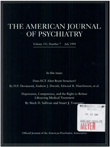Impact of psychiatric hospitalization on behavioral complications of Alzheimer's disease
Abstract
OBJECTIVE: The authors conducted a prospective study of the clinical utility of the four DSM-III-R subtypes of primary degenerative dementia of the Alzheimer type (with delirium, with delusions, with depression, or uncomplicated) and acute psychiatric hospitalization for treatment of these subtypes. METHOD: The subjects were 120 consecutive inpatients with Alzheimer's disease, most of whom had behavioral abnormalities. Each subject received detailed physical, neurological, psychiatric, and mental status examinations. The presence or absence of specific behavioral problems was also documented. Patients were treated with medication, psychotherapy, and behavioral techniques. RESULTS: While all patients could be assigned to one of the four DSM-III-R behavioral subtypes, the uncomplicated subtype did not accurately reflect the burden of behavioral symptoms in the patients who did not have delirium, delusions, or depression. Each behavioral subtype responded in a characteristic way to inpatient treatment, as reflected by changes in scores on four psychometric scales used to assess cognitive impairment, psychiatric symptoms severity, and level of functioning at admission and at discharge, as well as by changes in residential setting following hospitalization. Half of all patients admitted from their homes and two-thirds of those with depression were able to go home following discharge. CONCLUSIONS: Behavioral syndromes in Alzheimer's disease should not be overlooked, because they have both clinical and prognostic significance. Short-term psychiatric hospitalization is effective and efficient for achieving the goal of returning patients to their homes and for safely implementing specific treatments in this frail population, and it may reduce the need for institutionalization.
Access content
To read the fulltext, please use one of the options below to sign in or purchase access.- Personal login
- Institutional Login
- Sign in via OpenAthens
- Register for access
-
Please login/register if you wish to pair your device and check access availability.
Not a subscriber?
PsychiatryOnline subscription options offer access to the DSM-5 library, books, journals, CME, and patient resources. This all-in-one virtual library provides psychiatrists and mental health professionals with key resources for diagnosis, treatment, research, and professional development.
Need more help? PsychiatryOnline Customer Service may be reached by emailing [email protected] or by calling 800-368-5777 (in the U.S.) or 703-907-7322 (outside the U.S.).



